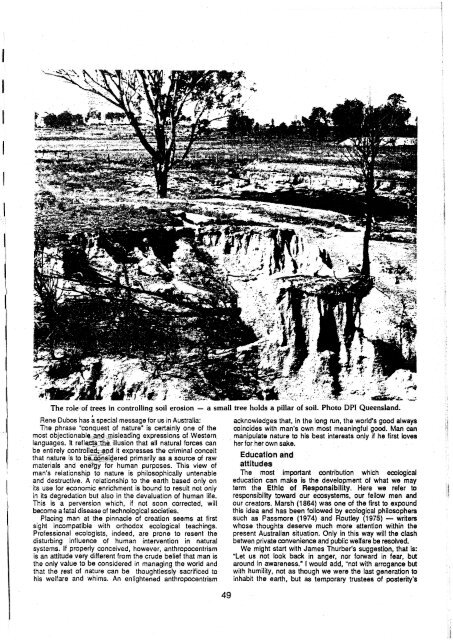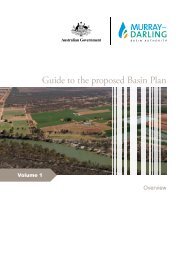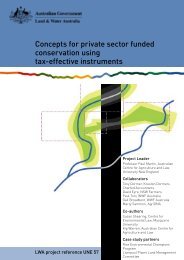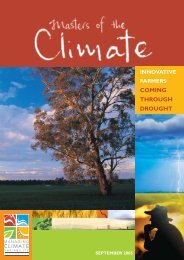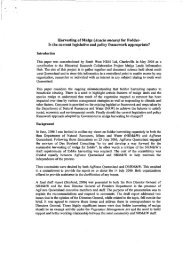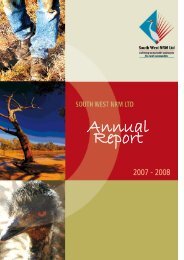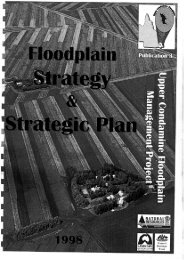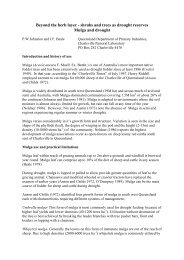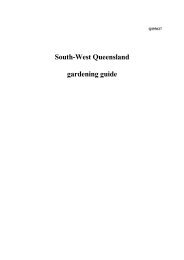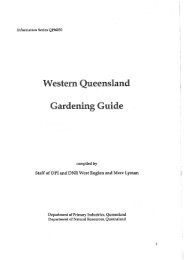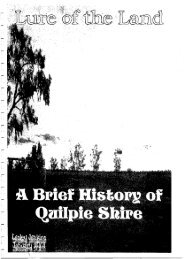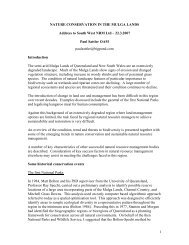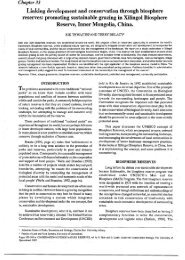soil-conservation-people-religion-and-land.pdf - South West NRM
soil-conservation-people-religion-and-land.pdf - South West NRM
soil-conservation-people-religion-and-land.pdf - South West NRM
Create successful ePaper yourself
Turn your PDF publications into a flip-book with our unique Google optimized e-Paper software.
The role of trees in controlling <strong>soil</strong> erosion - a small tree holds a pillar of <strong>soil</strong>. Photo DPI Queensl<strong>and</strong>.<br />
Rene Dubos has special message for us in Australia:<br />
The phrase "conquest of nature" is certainly one of the<br />
most obje~tionabla~a&~rnisleading expressions of <strong>West</strong>ern<br />
languages. It reflasthe illusion that all natural forces can<br />
be entirely controllect;gtad it expresses the criminal conceit<br />
that nature is to b-:aered primarily as a source of raw<br />
materials <strong>and</strong> eneigy for human purposes. This view of<br />
man's relationship to nature is philosophically untenable<br />
<strong>and</strong> destructive. A relationship to the earth based only on<br />
its use for economic enrichment is bound to result not only<br />
in its degredation but also in the devaluation of human life.<br />
This is a perversion which, if not soon corrected, will<br />
become a fatal disease of technological societies.<br />
Placing man at the pinnacle of creation seems at first<br />
sight incompatible with orthodox ecological teachings.<br />
Professional ecologists, indeed, are prone to resent the<br />
disturbing influence of human intervention in natural<br />
systems. If properly conceived, however, anthropocentrism<br />
is an attitude very different from the crude belief that man is<br />
the only value to be considered in managing the world <strong>and</strong><br />
that the rest of nature can be thoughtlessly sacrificed to<br />
his welfare <strong>and</strong> whims. An enlightened anthropocentrism<br />
-<br />
acknowledges that, in the long run, the world's good always<br />
coincides with man's own most meaningful good. Man can<br />
manipulate nature to his best interests only if he first loves<br />
her for her own sake.<br />
ducat ion <strong>and</strong><br />
attitudes<br />
The most important contribution which ecological<br />
education can make is the development of what we may<br />
term the Ethic of Responsibility. Here we refer to<br />
responsibility toward our ecosystems, our fellow men <strong>and</strong><br />
our creators. Marsh (1864) was one of the first to expound<br />
this idea <strong>and</strong> has been followed by ecological philosophers<br />
such as Passmore (1974) <strong>and</strong> Routley (1975) - writers<br />
whose thoughts deserve much more attention within the<br />
present Australian situation. Only in this way will the clash<br />
betwen private convenience <strong>and</strong> public welfare be resolved.<br />
We might start with James Thurber's suggestion, that is:<br />
"Let us not look back in anger, nor forward in fear, but<br />
around in awareness." I would add, "not with arrogance but<br />
with humility, not as though we were the last generation to<br />
inhabit the earth, but as temporary trustees of posterity's


